Written and Reviewed by Vikas Londhe M.Pharm (pharmacology)
Assisted By: Shakuntala Kawhale (M.Pharm pharmacology)

On May 20, 2025, a 23-year-old pregnant woman died in Jaipur’s prestigious Sawai Man Singh (SMS) Hospital, not from the illness she was fighting but from a blood transfusion mistake that was preventable and never should have happened.
A female patient from Tonk district, who was seven months pregnant, was admitted to SMS Hospital on May 12 with severe anaemia and miliary tuberculosis. Her pregnancy was already classified as high-risk. However, she was mistakenly given A+ blood, despite her actual blood type being B+.
The error was not caught until it was too late. By the time symptoms like fever, chills, hematuria, and rapid heart rate appeared, around 350 ml of incompatible blood had already been transfused. Patient succumbed to the reaction later that night.
Timeline of Errors
The tragedy was not the result of a single misstep but a chain of preventable lapses:
- No dual verification between the blood samples sent from the ward and the patient’s records.
- Incorrect blood group identification during ward-level preparation.
- Failure to match identifiers (yellow tag, ABHA ID, blood bag barcode) at the point of transfusion.
- Inadequate monitoring in the critical first 15–30 minutes post-transfusion, when early signs of reaction generally appear.
- No immediate escalation occurred when the patient developed symptoms, delaying corrective measures.
- Delayed and incomplete communication with her family, who were not immediately informed of the transfusion error.
This was the third transfusion-related death involving SMS and its affiliated hospitals in just over a year, highlighting a pattern of systemic failure.
What the Internal Inquiry Found and Why It Was Rejected
SMS Hospital conducted an internal investigation and acknowledged the transfusion error. However, the report controversially claimed that the mismatched blood was not the direct cause of death, pointing towards the patient’s tuberculosis and low haemoglobin levels.
This standpoint received immediate criticism from many levels. The Rajasthan government rejected the internal findings, labelled them unsatisfactory and ordered an independent, high-level investigation. Health Minister Gajendra Singh Khimsar announced the formation of a committee comprising senior doctors, administrative officials, and public health experts, tasked with submitting a report within three days.
The case also reached the Rajasthan State Human Rights Commission, which issued a notice demanding detailed reports by June 12.
Rajasthan Government’s Official Response: a Shift toward Safety
Under the public pressure and clear protocol violations, the Rajasthan government took immediate and serious action:
Key Policy Decisions Announced
Digital Blood Group mapping
All patients in state hospitals will now have their blood type linked to their Ayushman Bharat Health Account ID (ABHA ID), reducing room for clerical or manual entry errors.
Compulsory Admission—Time Blood Typing
Every patient must now undergo blood grouping at admission, with results entered into a centralized digital lab system.
Dual Verification at Blood Banks
Before releasing any blood unit, technicians must re-verify the patient’s blood type and documentation, independent of the ward-level grouping.
Detailed Chain of Custody Documentation
Blood request forms must now contain:
Name and mobile number of the requesting resident
Attending the duty doctor’s name
Name of the staff that collected the sample and the blood bag
Standardized Monitoring Protocol during Transfusion
Clinical staff must now:
Match the patient ID, yellow wristband, and blood label
Monitor vitals at 0, 5, 15, and 30 minutes during the transfusion
Record all observations in real time
Statewide SOP Enforcement across RMES Hospitals
SMS-level safety protocols are now mandatory across all government medical colleges and district hospitals under the Rajasthan Medical Education Society (RMES).
Patient Safety Lessons: When Systems Fail, People Pay the Price
The loss of life is a staggering reminder of how even routine clinical procedures can turn deadly without robust precaution. Blood transfusions are considered high-alert medical procedures, requiring multiple fail-safe mechanisms to prevent mismatches. When these mechanisms are skipped whether due to staff shortages, lack of training, or system fatigue the consequences are often fatal.
This case illustrates the urgent need for error-proof processes, accountability tracking, and a culture where speaking up about unsafe practices is encouraged.
Pharmacally’s Take: Reform Begins with Acknowledging the Risk
While the Rajasthan government’s response has been proactive and progressive, the real test lies in enforcement. Policies on paper must translate to practice on the ground. Frontline workers residents, nurses, lab techs must be trained, audited, and supported in following these updated protocols.
At Pharmacally.com, we advocate for healthcare systems that:
- Prioritize patient safety
- Embed digital tools to reduce human error.
- Enforce chain-of-responsibility in critical procedures, and
- Promote transparent investigations when outcomes go wrong.
Final Word: From Tragedy to Transformation
This patient should have gone home with her newborn in a few months. Instead, her death has exposed deep vulnerabilities in our public health system. If Rajasthan succeeds in turning this tragedy into a safety revolution, it could become a blueprint for the rest of India.
References:
Gandhi a, görlinger k, nair sc, kapoor pm, trikha a, mehta y, handoo a, karlekar a, kotwal j, john j, apte s. Patient blood management in india-review of current practices and feasibility of applying appropriate standard of care guidelines. A position paper by an interdisciplinary expert group. Journal of anaesthesiology clinical pharmacology. 2021 jan 1;37(1):3-13.
Bisht a, singh s, marwaha n. Hemovigilance program-india. Asian journal of transfusion science. 2013 jan 1;7(1):73-4.
Mammen jj, asirvatham es, sarman cj, ranjan v, charles b. A review of legal, regulatory, and policy aspects of blood transfusion services in india: issues, challenges, and opportunities. Asian journal of transfusion science. 2021 jul 1;15(2):204-11
Rajasthan to streamline blood transfusion system in all hospitals, News Arena India, https://newsarenaindia.com/nation/rajasthan-to-tighten-hospital-blood-transfusion-rules/45595
State Gov to tightens blood safety protocols after transfusion deaths, times of India, https://timesofindia.indiatimes.com/city/jaipur/state-govt-to-tighten-blood-safety-protocols-after-transfusion-death/articleshow/121421643.cms
Rajasthan hospital accused of fatal transfusion error after pregnant woman, 23, dies, The Economic Times, https://economictimes.indiatimes.com/news/india/rajasthan-hospital-accused-of-fatal-transfusion-error-after-pregnant-woman-23-dies/articleshow/121362945.cms?from=mdr

